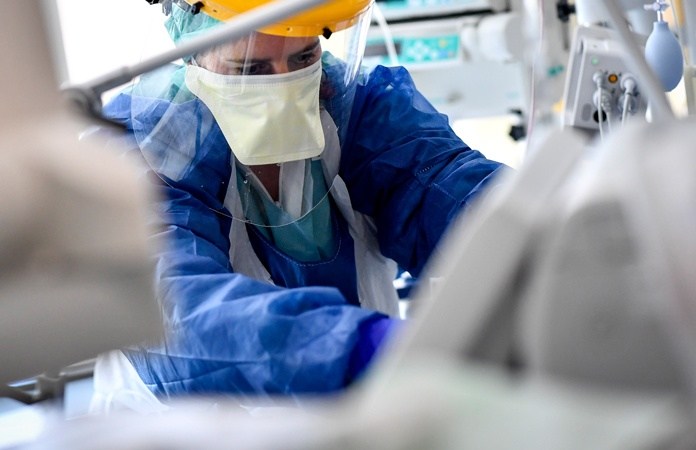It's official. For the first time since the start of Belgium's confinement, the country has taken a step back following the latest meeting of the National Security Council, not that this is entirely surprising news.
From Saturday 25 July, Belgium will implement new restrictions to stop the further spread of the coronavirus instead of further relaxing the measures, Prime Minister Sophie Wilmès announced on Thursday.
This includes wearing a face mask, which will now be mandatory in more public places, a new closing hour for night shops and contact tracing efforts in bars and restaurants - but there is so much more, so best to check out the story in full.
Of all the outcomes that could have come out of the meeting of the national security council meeting yesterday, the one that seemed the most expected... didn't happen. Despite widespread recommendations to do so by experts across the country, contact bubbles of 15 people per week remain allowed, but Wilmès stressed that it is important that people do not see more people than that.
“It’s a blow to our morale but we must take action today so that we have no regrets tomorrow. We must act collectively. Everyone is an actor in this crisis,” said Wilmès. “These rules are not advice but instructions,” she added.
So as you wait, wonder or work, let's have a look at the news out there.
1. Local authorities use the powers the government gave them
The meeting of the national security council on Thursday would normally have announced some further relaxations of the lockdown in what would be Phase Five of the deconfinement.
Instead, given the rise in new infections over more or less the last two weeks, and the rise in hospital admissions that inevitably follows, the latest meeting of the council decided that Phase Five was suspended, and instead, some relaxations would be reversed.
Meanwhile, on the local level, municipalities, having had the responsibility for dealing with flare-ups and a possible second wave thrust upon them by the various governments, have taken to the task like a fish to water. Here's what they have been doing.
2. Belgium breaks an average of 200 new coronavirus infections per day
An average of 220.6 people per day tested positive for the new coronavirus (Covid-19) in Belgium during the past week, according to figures by Sciensano on Friday.
The trend of new infections per day has risen by 89% over the 7-day period from 14 to 20 July, compared to 117 new cases a week earlier. The figures are rising almost everywhere in the country and across all age groups, according to Sciensano’s dashboard. Read More.
3. Coronavirus: 3-year-old dies in Belgium
Several days ago, a 3-year-old toddler died as a result of the coronavirus in Belgium, the health authorities announced during a press conference on Friday.
“This news affects us deeply, as scientists, but also as parents. We would like to express our deepest sympathy to the family,” said Boudewijn Catry, spokesperson for Sciensano. Read More.
4. The state of teleworking: Should you still be working from home?
As Belgium lifts confinement measures – and implements others – one question hasn't been touched in a while.
Should people in Belgium still be working from home?
According to Sandy Deseure, spokesperson for the Federal Public Service for Employment, the advice is very much yes, unless an employer deems it necessary that staff perform their duties from their workplace. Read more.
5. Brussels- Sweden night train comes one step closer
A direct train link between Brussels and Malmö in Sweden moved one step closer yesterday, when the government in Stockholm gave the country’s transport authority the instruction to acquire sleeper carriages and organise timetables for two routes: Brussels-Malmö and Stockholm-Hamburg. Read More.
6. Coronavirus: digital returning travellers’ form available from Monday
A mandatory form for travellers returning to Belgium will be available digitally from Monday 27 July to facilitate contact tracing procedures.
The form will be compulsory for anyone over 16 having spent more than 24 hours abroad and coming back into Belgium by land, sea or air.
The returning traveller’s form applies to returnees from countries in all colour-code categories and will be available from next Monday, Karine Moykens, head of the testing and tracing force, told De Standaard. Read more.
7. Brussels makes face masks mandatory on high street and pedestrian zone
Wearing a face mask will be mandatory from 27 July for anyone walking through the Brussels’ pedestrian zone or in the bustling Rue Neuve.
Brussels 1000 Mayor Philippe Close announced the new measures after officials at the National Security Council (NSC) meeting tightened rules to slow the rising curb of new Covid-19 infections in Belgium.
“Even if the figures for new infections for the City of Brussels remain low today, I call on our people and on visitors to be and remain vigilant,” Close said. Read more.
Jules Johnston
The Brussels Times



